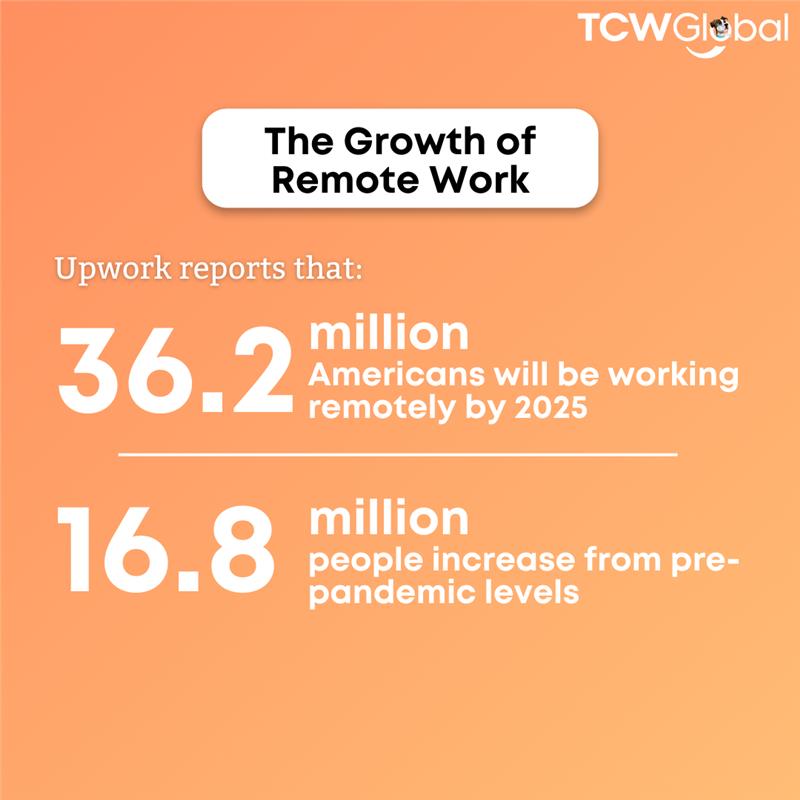Employers of Record are Revolutionizing Remote Workforce Management

March 21, 2023

Rise of the remote workforce
Introduction
Let’s face it, remote work has taken the world by storm!
A recent study by Upwork found that 36.2 million Americans will be working remotely by 2025, an increase of 16.8 million people from pre-pandemic levels. In other words, remote work is here to stay, and we have the numbers to prove it!
As the number of remote workers continues to grow, managing remote teams has become a top priority for employers. While remote work offers many benefits, such as increased flexibility and autonomy for workers, it also poses unique challenges for employers, such as ensuring effective communication, collaboration, and productivity, but that’s when we come in.
- The traditional HR set-up may not be the best to handle a remote workforce since an HR department is to assist a company’s internal workforce. This is where an Employer of Record Services (EOR) like TCWGlobal can help.
- An EOR provides some of the HR related solutions for remote teams, including payroll processing, benefits administration, and compliance management. EORs also offer expert guidance on how to navigate the complexities of remote work, ensuring that employers and their remote teams can operate smoothly and efficiently while staying on top of the local laws and regulations.
We’re going to delve deeper into how EORs are transforming remote workforce management and explore the benefits they offer for companies and their remote teams. We will also examine some of the challenges that companies face when managing remote teams and how EORs can help overcome them.

Storytime: The Rise of Remote Work
The rise of remote work is an undeniable trend that has been gaining momentum over the years, and as we discussed above, it’s not going anywhere.
It all started in the early 2000s when companies like 37signals, a Chicago based software company and Basecamp began hiring remote workers to expand their talent pool. These early adopters found that remote workers were often more productive, happier, and more engaged than their in-office counterparts. Over time, other companies started to follow suit, and the number of remote workers began to grow. Today, we have countless examples of companies that have successfully implemented remote work., from large corporations like Dell, IBM, and Amazon to startups like Buffer and Zapier. These companies have shown that remote work is not only possible but also beneficial, allowing workers to work from anywhere in the world and offering companies access to a global talent pool.
Challenges of Managing a Remote Workforce
Let’s get real for a moment, managing a remote team comes with its unique set of challenges. One of the biggest challenges is communication. It’s no lie that remote teams rely heavily on technology to stay connected, so companies need to ensure that their remote team members have the necessary tools and resources to communicate effectively and collaborate on projects. They also need to establish clear expectations and guidelines to ensure that everyone is on the same page. We hate to say it but managing performance can also be challenging when there is no physical presence to monitor work progress.
- Communication and collaboration. In-person communication is often easier and more efficient than digital communication (HA!). When workers can't see each other, they have to rely on tools such as email, voicemail or chat apps to communicate important information (the list goes on). This can easily lead to miscommunication and confusion among team members who are working remotely from each other.
- Productivity issues. One of the risks of having a remote workforce is that pPeople are less likely to be productive when they don’t don't feel like they'’re being watched by their managers or coworkers. Though this isn’t always the case, we need to consider all possible scenarios. #FACTS
- Risk management. It's harder for managers to keep tabs on their workers when those workers aren't physically present at work every day. This can make it harder for managers who manage distributed teams to make sure everything is running smoothly, especially if they are working in a different time zone.
Alright, let’s turn this energy around and bring some positive vibes to the conversation.
Benefits of Having a Remote Workforce
Now that we know and understand the challenges, this is where working with an Employer of Record (EOR) comes in handy. EOR companies t provide administrative support to manage payroll, benefits, and compliance for remote workers.
By partnering with an EOR, companies can focus on their core business activities while leaving the administrative work to the experts. Having a remote workforce can also be a win-win situation (pinky promise).
- Increased flexibility. Workers can work from anywhere with an internet connection, providing a better work-life balance and reducing the stress and cost associated with commuting. This can lead to higher job satisfaction and lower turnover rates, as workers are more likely to stay with a company that offers flexible work arrangements.
- Cost savings for companies. They may not need to provide as much office space, equipment, and supplies for their workers. According to a study by Global Workplace analytics, remote work can save companies up to $11,000 per worker per year in overhead cost. (That’s huge, especially for smaller companies trying to reduce expenses).
- Increased productivity. Workers have fewer distractions and can work in an environment that suits their needs and preferences. This can result in higher quality work and faster turnaround times. A study by Stanford University found that remote workers were 13.5% more productive in a remote environment.
From a worker’s perspective, it means the freedom to work from home, which eliminates the need for a daily commute and saves time and money. It also offers more flexibility to balance work and personal life, which can lead to increased job satisfaction and better mental health.
It’s safe to say that remote work is like the avocado toast of the job world. It’s trendy, flexible, and full of benefits. (can you tell we’re in California?)
What is an Employer of Record?
The answer to your prayers. The unicorn you didn’t know was real.
An EOR is a company that is responsible for paying the employer's share of taxes and benefits. The EOR is responsible for withholding taxes from a worker’s paycheck and filing them with government agencies.
But wait, there’s more! In addition to tax management, an EOR can handle many tasks related to managing a remote workforce:
- Providing workers with tax documents such as a W2
- Ensuring compliance with local labor laws and providing tools for onboarding new hires
- Utilizing a timekeeping system that can tracki workers’ hours worked across multiple projects at once
- The HR solution you didn’t know you needed
EORs Are Transforming The Workforce
EOR services help companies navigate the legal and regulatory complexities of hiring and managing remote workers. By leveraging technology, these services streamline the onboarding process, making it easier for businesses to hire workers without worry.
EORs are good for companies because they save time and money by taking care of all payroll-related tasks related to hiring a contingent workforce, including:
- Deducting taxes from worker paychecks
- Reporting all required information to federal agencies such as IRS
- Processing payroll on time and accurately
- Providing workers with required documents, such as a W2
Without an EOR to ensure compliance with employment laws and regulations, businesses could face a minefield of potential legal issues and lawsuits, ranging from costly penalties and fines to damaging reputational harm and even bankruptcy.
We’re aware that the topics we're discussing may seem complicated, but the reason why an employer of record can be helpful for your business is because it takes care of those difficult tasks for you.
Conclusion
The rise of the remote workforce is a trend that's here to stay. It's not just about making it easier for workers to work from home or on the road, but also about making sure that businesses are taking care of their workers. Employers of Record are revolutionizing this process by providing organizations with an easier way to manage their global teams and make sure they're complying with all applicable laws and regulations.
If you’re looking for an EOR, look no further, TCWGlobal is here to make your life easier so you can focus on what you do best and have peace of mind. Give us a call at 858-810-3000, we’re always happy to help!

